Gefährliche Fracht is a film of genre Drama directed by Gustav von Wangenheim with Erika Dunkelmann
Gefährliche Fracht (1954)
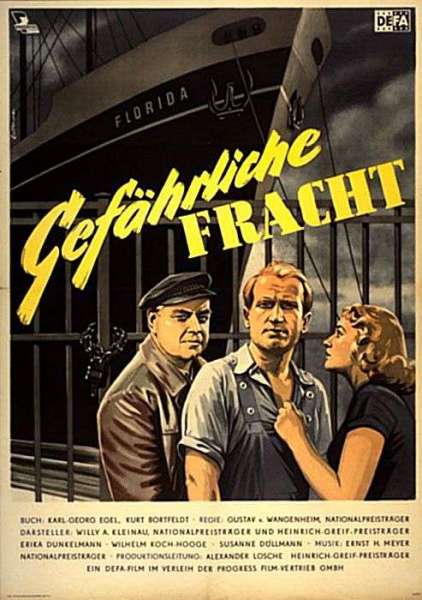
If you like this film, let us know!
Directed by Gustav von Wangenheim
Gefährliche Fracht is an East German film. It was released in 1954.
Actors

Erika Dunkelmann
(Bertha Köhlermann)

Hannjo Hasse
(Sekretär)

Eduard von Winterstein

Theo Shall

Kurt Jung-Alsen
Comments
Leave comment :
Suggestions of similar film to Gefährliche Fracht
There are 23 films with the same actors, 3 films with the same director, 67819 with the same cinematographic genres (including 3835 with exactly the same 2 genres than Gefährliche Fracht), to have finally 70 suggestions of similar films.If you liked Gefährliche Fracht, you will probably like those similar films :
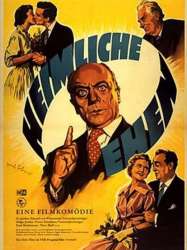
Heimliche Ehen (1956)
, 1h33Directed by Gustav von Wangenheim
Genres Drama, Comedy
Actors Gerd Michael Henneberg, Theo Shall, Armin Mueller-Stahl, Eduard von Winterstein

Hoegler's Mission (1950)
, 1h33Directed by Gustav von Wangenheim
Genres Drama
Actors Fritz Tillmann, Alice Treff, Arno Paulsen, Eduard von Winterstein, Reinhard Kolldehoff
Högler, the former director of a steel plant now in East Germany, is a rich and ruthless capitalist residing in West Germany. He wishes to lay his hands on the new technical innovations that were developed by Dr. Thelen, who now runs the factory after it has been nationalized. Högler tries to besmirch Thelen by organizing sabotage in the factory, threatening to kill innocent workers to destroy the scientist's reputation. Two trade union activists - the West German Maria and the East German Fritz - who know each other since they have both fought in the wartime anti-Fascist resistance, unite to thwart the capitalist's plans.
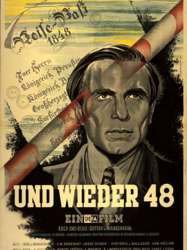
Und wieder 48 (1948)
Directed by Gustav von Wangenheim
Genres Drama
Actors Wilhelm Borchert, Josef Sieber, Eduard von Winterstein, Ernst Legal, Paul Bildt, Arthur Schröder

The Sons of Great Bear (1966)
, 1h32Genres Drama, Action, Adventure, Western
Actors Gojko Mitić, Hans Finohr, Jiří Vršťala, Hannjo Hasse, Henry Hübchen, Brigitte Krause
Rating57%





In 1874, the U.S. government encroaches on the lands of the Lakota people. Mattotaupa, an Oglala Lakota man, gambles with Red Fox, a White criminal, in a saloon. When seeing he has gold, Red Fox demands to know its origin. Mattotaupa refuses, and Red Fox murders him. Mattotaupa's son, the young and fierce warrior Tokei-ihto who mistrusts the Whites and never drinks their "Firewater", witnesses the murder.

Trail of the Falcon (1968)
, 2h1Directed by Gottfried Kolditz
Genres Drama, Adventure, Western
Actors Gojko Mitić, Hannjo Hasse, Barbara Brylska, Michael Gwisdek, Winfried Glatzeder
Rating57%





1875. Ce sera bientôt la Ruée vers l'or dans les Black Hills. Le gouvernement américain ne parvient pas à acheter leurs terres aux Lakotas. Il va prendre ces terres par la force et mettre les Indiens dans des réserves.

A Berlin Romance (1956)
, 1h21Genres Drama, Romance
Actors Annekathrin Bürger, Ulrich Thein, Erika Dunkelmann
Rating66%





The film is a love story about a seventeen-year-old East German saleswoman named Uschi (Bürger) and an unemployed auto mechanic named Hans (Thein) from West Berlin. She leaves her familial home and moves into West Berlin, drawn by the brightness of the high streets and the economic progress in the West German side of the city. She initially dates Lord (Uwe-Jens Pape), a wealthy, leather-jacket-wearing ladies man, highly conscious of his own self-image and style. He is strongly influenced by American movie heartthrobs of the times.
 , 1h54
, 1h54Directed by Günter Reisch
Genres Drama
Themes Political films
Actors Albert Hetterle, Erika Dunkelmann, Siegfried Weiss, Hans Finohr, Adolf Fischer, Werner Dissel
Rating72%





The film opens in Berlin in 1914, as Germany is preparing for World War I. Liebknecht (Schulze) receives a call from a fellow lawyer and revolutionary, Mr. Rauch, that documents have been found proving the German heavy arms industry's secret involvement in the buildup to the war. He brings these documents to a meeting of the Reichstag, accusing Gustav Krupp and his company of bribing officials to release military secrets. In addition to this, Krupp and his company wrote to ask the French media to state that the French military has twice as much artillery as they actually possess so that they may provoke a surge in militarism. Afterward, while celebrating a friend's wedding, Liebknecht learns of the assassination of Archduke Franz Ferdinand, recognizing that this is the war the German imperialists were seeking. However, the resources for war still need to be approved. Liebknecht immediately begins campaigning among the public, denouncing the war as a means to secure profit for the capitalists. In an SPD party meeting, Liebknecht is one of only fourteen members to vote against the war credits. In the subsequent Reichstag meeting, he votes with the party discipline in favor of the war credits, to the public's surprise. He announces in the party meetings that he will no longer yield to party discipline and will stand by his anti-militarist principles even if the party leadership will not do the same. Liebknecht is the only one of the Reichstag — including 111 SPD representatives — to vote against the war loans, resulting in a number of death threats and work bans. Despite his immunity as a Reichstag member, Liebknecht is called to serve on the front as a sapper. It is here that he writes his 1915 manifesto, "The main enemy is at home!" The manifesto is passed among his fellow soldiers on the front before returning home. While he is away, Paul Schreiner, whose wedding Liebknecht attended earlier in the film, dies on the front. This leaves his wife Käthe to raise their newborn child alone and make Liebknecht's manifesto public.
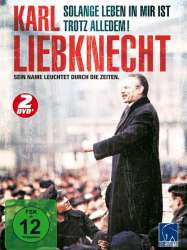 , 1h54
, 1h54Directed by Günter Reisch
Genres Drama, Biography, Historical
Themes Politique, Political films
Actors Mikhaïl Oulianov, Albert Hetterle, Jutta Hoffmann, Erika Dunkelmann, Zofia Mrozowska, Siegfried Weiss
Rating72%





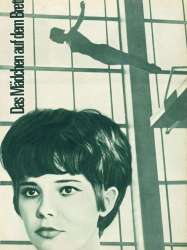
The Girl on the Diving Board (1967)
Directed by Kurt Maetzig
Genres Drama
Actors Hannjo Hasse, Monika Woytowicz, Helga Göring, Norbert Christian
 Connection
Connection
